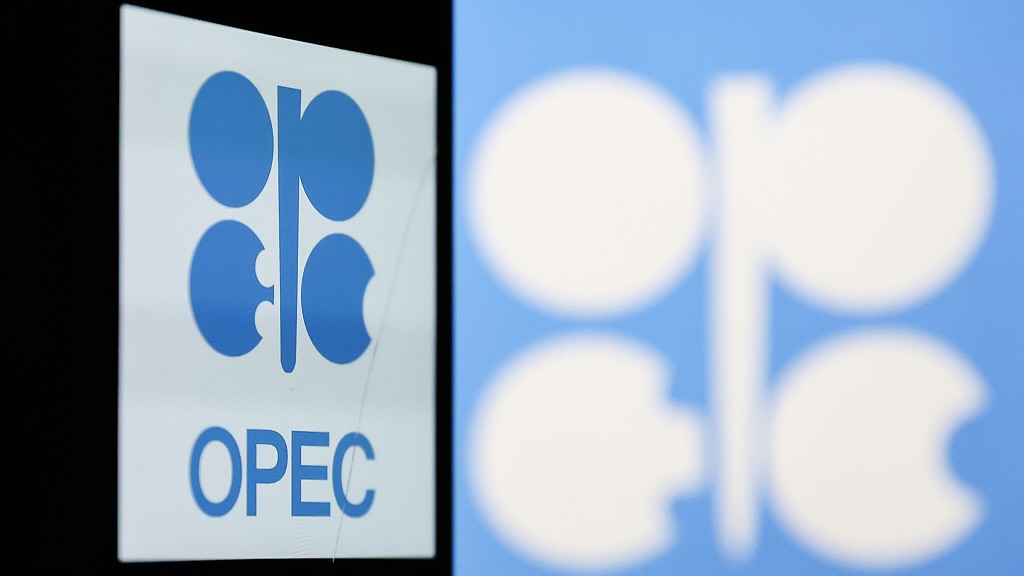
The unity of OPEC+ members in making the decision to cut production shows that they no longer tolerate repeated fluctuations in oil prices caused by U.S. monetary policy and are determined to resist arbitrary manipulation of oil prices. /CFP
The unity of OPEC+ members in making the decision to cut production shows that they no longer tolerate repeated fluctuations in oil prices caused by U.S. monetary policy and are determined to resist arbitrary manipulation of oil prices. /CFP
Editor's Note: Cui Shoujun is a professor with the School of International Studies, and Deputy Dean with the School of Global Governance, Renmin University of China. The article reflects the author's opinions and not necessarily the views of CGTN.
Oil prices rose following the surprise OPEC+ announcement in early April to cut oil production by 1.66 million barrels per day, adding to the 2 million barrels per day reduction last October. The two rounds of OPEC+ production cuts will take 3.66 million barrels per day off the market in total, accounting for about 3.7 percent of global supply, which will upset the fragile balance of the global oil market.
OPEC has 13 member countries, and OPEC+ has 23, led by Saudi Arabia and Russia respectively. The entire OEPC+ group produces about 30 million barrels per day, and the global oil supply is about 100 million barrels per day. So OEPC+ production accounts for roughly one-third of the market supply and has a huge impact on the price of crude oil.
As soon as news of the production cuts was released, several Wall Street institutions raised their crude oil price forecast to $100/barrel for the second half of this year. This makes the U.S. administration uneasy as the potential inflation risks from rising oil prices may make it increasingly difficult for the U.S. Federal Reserve to find a balance between prices and financial stability.
Economists believe that there is a causal relationship between rising oil prices, rising inflation and recession. When the price of oil rises, inflation tends to follow. And high inflation will prompt central banks in hyperinflationary economies to take more aggressive austerity measures to stabilize prices. In this way, these economies will inevitably slow further, which in turn will lead to a recession. This is exactly why the OPEC+ decision to cut production has infuriated the U.S. Federal Reserve.
It then follows that further cuts in oil production by OPEC+ will lead crude oil prices to continue to rise, and this will undoubtedly further exacerbate U.S. inflation. What's more, in order to tame inflation, the Federal Reserve has raised interest rates to the highest level since 2007, which has caused upheaval in the banking sector.
The OPEC+ decision to cut production at this moment will undoubtedly add uncertainty and complexity to the U.S. economy, leaving it open to recession. For this reason, The U.S. Treasury Secretary Janet Yellen, who previously served as the U.S. Federal Reserve chair, has described the decision as being "unconstructive" and detrimental to U.S. efforts to curb inflation.
Saudi Arabia, the de facto leader of OPEC and the world's largest exporter of crude oil, will cut production by 500,000 barrels per day. Saudi Arabia said in a statement the move is a "precautionary measure aimed at supporting oil market stability." Russia echoed this saying "the satisfaction or dissatisfaction of some countries is a private matter for them."
Why are the major oil producers rallying to cut production? It is mainly due to irresponsible U.S. monetary policy. Weakening, manipulating and controlling OPEC is a key goal of U.S. energy policy. Over the past two years, the U.S. Senate has been pushing to pass the No Oil Producing and Exporting Cartels Act (NOPEC), which will allow for legal action to be taken against OPEC countries under U.S. antitrust laws. Saudi Arabia has threatened to sell its oil in currencies other than the U.S. dollar if Washington goes ahead and passes the bill.
Since the 1970s, the U.S. dollar has been the dominant reserve currency worldwide. Agreements with Saudi Arabia and numerous other Middle Eastern nations solidified the global oil market's use of the U.S. dollar. However, since the outbreak of the Russia-Ukraine conflict and Russia's exclusion from SWIFT, which is denominated in dollars, a number of geopolitical and economic variables have begun to work against the U.S. dollar's hegemony. Among them is the accelerating de-dollarization trend.
In the past few months, in order to curb hyperinflation, the Federal Reserve has taken aggressive measures to lift interest rates, causing the dollar to spike significantly and oil prices to fall accordingly, resulting in many oil exporting countries suffering huge losses. Since March this year, the U.S. banking sector has been in crisis, crude oil prices have plummeted in a short period of time and the Federal Reserve has announced a further interest rate hike.
The joint action of OPEC+ members shows that they are determined to maintain oil price stability to sustain their domestic economies and are refusing to succumb to U.S. pressure, posing a challenge to dollar hegemony.
The unity of OPEC+ members in making the decision to cut production shows that they no longer tolerate repeated fluctuations in oil prices caused by U.S. monetary policy and are determined to resist arbitrary manipulation of oil prices.
Oil and other commodities have long been denominated in U.S. dollars, and the U.S. has used this to exploitother countries using its currency, which in turn has destroyed the credibility of the dollar.
As the U.S. is increasingly isolated from the rest of the world and its global influence declines, the hegemony of the petrodollar will begin to be challenged, and de-dollarization will become inevitable.